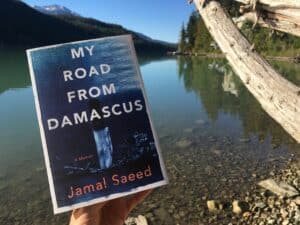Truth is strange and challenging in new memoir

Until I read Jamal Saeed’s My Road from Damascus.
Stories we hear about Syria in the media, come true on paper as I turn leaf-after-leaf of Saeed’s memoir. Saeed evocatively narrates his torturous experience of spending what should have been the carefree decades of his youth, incarcerated. He was nabbed for his thought-provoking writing, multiple times, without due process under Syria’s oppressive regime. During this time behind these walls, life became arduous; he lost friends, his relationships evolved, his lovers moved on and his country fell deeper and deeper into darkness. In these pages, the author holds our hand and leads us along the course of his personal journey from Damascus to Kingston, Canada.
It took me by surprise how Saeed is able to interweave calm detachment and often, even humour into situations that must have been bizarre and horrific at the moment. For instance, waiting in an interrogation room with complete uncertainty of what sort of beating awaited him, he is able to muse that the fact that so many muscular, violent guards are always available to interrogate prisoners, must be a result of there being a large number of unemployed thugs in the city.
The distance he maintains from his own moments of agony is remarkable. For a while, I forget, that the narrator is sharing his lived experience, and at the moment that I am reminded again, I feel a deep sense of honour and gratitude, that I should be allowed this candid peek into his life. Saaed makes a friend out of every reader.
As I read, I could not help but think — how does this author manage wit and a beautiful sort of sorrow at the same time? A poignancy, an ache that very few authors successfully create within the reader. Interspersed with nostalgic accounts of a simple childhood where he tried to make sense of the world, the innocence of peaceful days, the dilemmas of old friendship and debt, and idealistic visions of what romance could be and should become, his story continues to paint a moving picture of late twentieth century Syria. The details he captures make me long for the beauty of that world and shudder at its horrors at the same time.
Interesting characters make appearances in his life story pointing out the delicateness and poignancy of human relationships. Widad’s disarming beauty that becomes morphine for the dark hours in the cell. Mustafa’s predicament in deciding whether the debt of friendship should trump his duty. Imad’s innocent plea to keep him in memories, or Rufaida’s unstereotypical courage and enduring love. Every person throws light on a different aspect of the human experience in Damascus of the late ‘80s and ‘90s.
His accounts make me appreciate the smallest luxuries of civilised society based on modern ideals of democracy and universal human rights. Things that have become ambient and taken for granted in my day-to-day life in the free society in which I get to live. The next time I pass the aisle of handmade, sweet-smelling soap bars at Fresh Street Market, I will be sure to linger just an extra few seconds to become aware of the privilege. Undoubtedly, I will be reminded of Saeed’s account of how much something as trivial as the scent of a proper soap could mean to a prisoner unjustly incarcerated with no end in sight.
And yet, Saeed demonstrates repeatedly how the human spirit triumphs in unexpected ways in even the worst of conditions. When life gives you stones in your lentil soup every day, it takes a truly resilient spirit to use humble gravel as instruments of artistic expression where you imagine a game.
Towards the conclusion of his journey, I relate to the author’s experience as an immigrant in Canada. His storms may have passed, but it takes a long time for the past to eject out of anyone’s system, if at all. Although I can claim no familiarity with the experience of a family seeking asylum in a distant land and making a new home from scratch, I empathise with the feeling of being “from another world”.
His readers are fortunate that they will get a glimpse into that other world through his memoir. And into the life of a human being whose inner world is shaped by both, excruciating experience, and an unrelenting belief in life itself. Towards the end, the author, with his signature humility, states, “We are a small detail in the history of Syria…”
Saaed will be joining the panel at the Sunday Book Talk: Coffee and Conversation at 11 a.m. at the Fairmont Chateau Whistler (in-person and online). Saaed will also be part of the panel discussing Finding Light through the Darkness: Nurturing Hope in YA & Kid Lit, at 1:30 p.m. at the Whistler Public Library (in-person and online). Tickets are available online.
Review is by Prajakta Kharkar Nigam, who is an economist who after living and working internationally for years, is now living in Whistler and writing about her family’s unschooling experiment. When not writing, she can be found hiking in the mystical forests of Whistler or discussing public policy with her classmates in the Harvard Kennedy School’s Public Leadership program.
